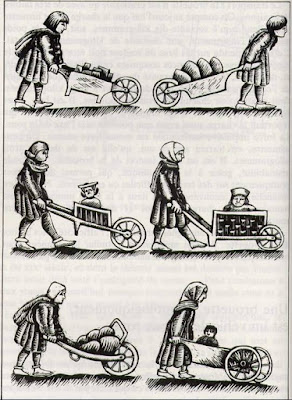“A genuine antique with an authentic squeak”
A wheely special garden feature for the Museum
I’ve
been waiting quite a time for a spell of fine weather and some summer
floweriness to show off this garden feature at Fairlynch Museum. Yesterday it
was looking at its best when it was joined
Wheelbarrow
planters are common enough items for sale at garden centres. But this one,
sited on the pavement outside the Museum, is rather special, says Bob
Wiltshire, chairperson of Budleigh in Bloom, which donated the wheelbarrow and
arranged the display. It is, with its metal wheel, so Bob tells me, “a genuine
antique with an authentic squeak.”
It's certainly over 100 years old and came originally from Lochmaben, a small town in Scotland, according to Sylvia Pavey, the local resident who gave it to Budleigh in Bloom. She looks forward to seeing it for many years more, looking splendid with ever-changing floral displays in its final resting-place outside the Museum.
It's certainly over 100 years old and came originally from Lochmaben, a small town in Scotland, according to Sylvia Pavey, the local resident who gave it to Budleigh in Bloom. She looks forward to seeing it for many years more, looking splendid with ever-changing floral displays in its final resting-place outside the Museum.
Wheelbarrows have been around for
a very long time of course, as shown in these pictures of medieval models.
Going further back, the earliest archaeological evidence has been found in
China. The painted tomb mural of a man pushing a wheelbarrow was found in a
tomb at Chengdu, Sichuan province, dated precisely to 118 AD.
And
in China a noisy wheelbarrow seems to have been accepted as part of normal life, from what the writer
Pearl S. Buck remembers of her time in the country. “Wheelbarrows squeak shrilly along; the more
loudly the better, for each wheelbarrow man cultivates his barrow’s squeak
assiduously for good luck’s sake,” she wrote in her 1954 autobiography My Several Worlds: A Personal Record.
But
on the smartest English estates of the past, the squeak was something that was
frowned on. At Bicton Botanical Gardens, just a few miles up the road from
Budleigh Salterton, they’ve posted the Rules and Regulations of the Plant
Department as published by Head Gardener J. Barnes on 26 September 1842.
Among
the “rules to be strictly attended to” we find that “Neglecting to grease a
wheelbarrow when requisite” resulted in a fine of 3d – 55p in today’s
money. The same amount was levied on a
worker guilty of “taking a wheelbarrow with a dirty wheel on the walks.”
I
expect the Head Gardener insisted that all Bicton’s wheelbarrows had to be
squeaky clean.







Comments
Post a Comment